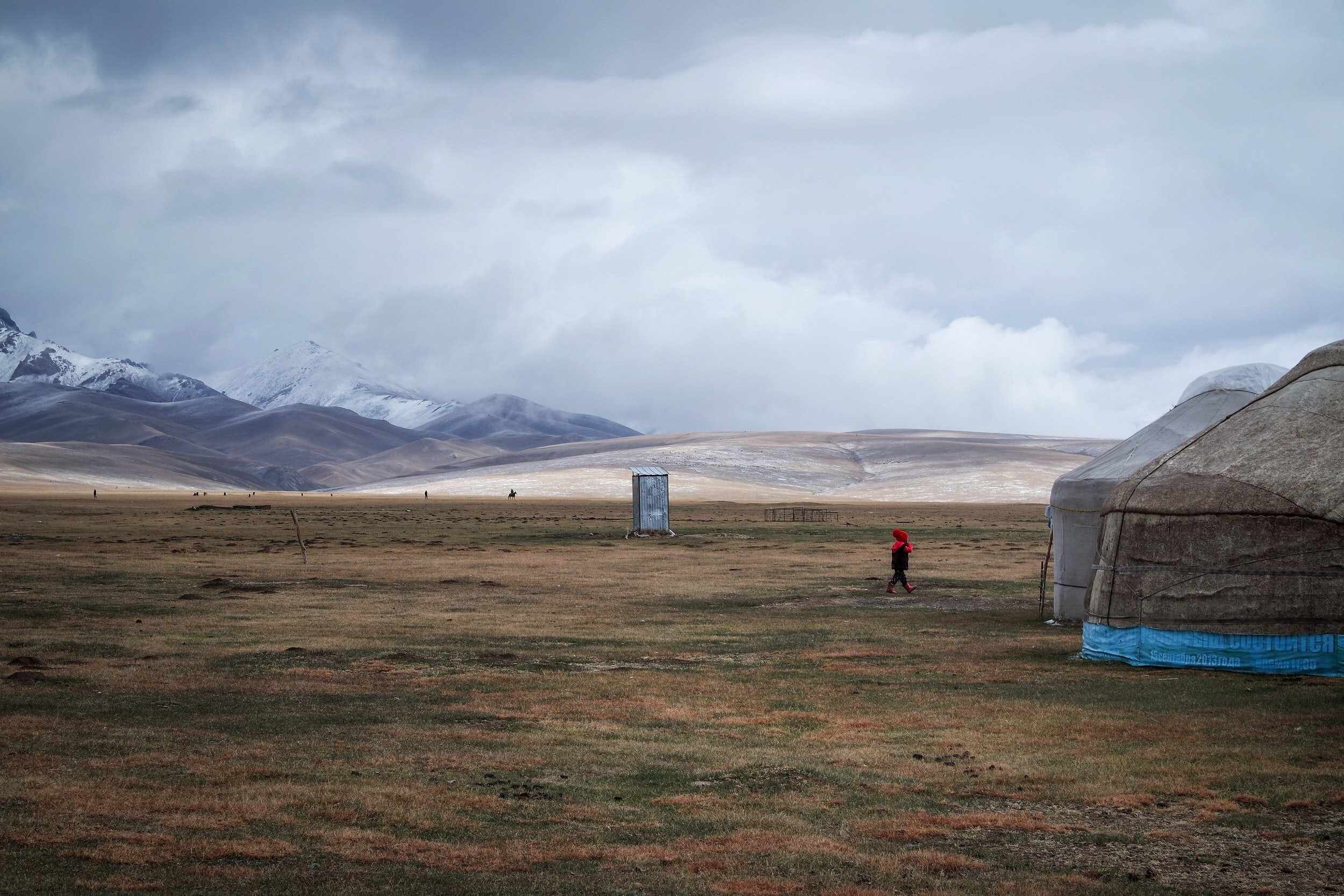
Central Asian film
Feature length films and DOCUMENTARIES set in
Kazakhstan, Kyrgyzstan, Tajikistan, Turkmenistan, and Uzbekistan:
DAUGHTER-IN-LAW
A film from Turkmenistan. (75 minutes, 1963.) This film is for general audiences. Shown by permission of Open Society Institute. An old goat and sheep herder and his daughter in law breed lambs in an isolated part of the desert with rarely a visitor. She lives with images in her mind of her husband, awaits his return from the battlefront, and hopes he is still alive. Gulnara Abikeyeva our Central Asian film expert describes: “The war has taken her husband. And this dream – to sing a song at the baby’s cradle – is carried out to the culmination of the film.” One of the heroes of the film is “an always awaited child” who “will never appear.” The film moves in the rhythms and landscape of traditional Turkmen lifestyle, opening with old man buried in the hot sand up to his neck to treat his rheumatism. Later they dry melons for winter, and take in newborn lambs. This film has won prizes at many film festivals.
LITTLE ANGEL, MAKE ME HAPPY
A film from Turkmenistan. (88 minutes, 1993.) This film is for general audiences. During World War II in Turkmenia, the deportation of Soviet citizens of German origins begins; adults are sent to concentration camps, children to orphanages. Six-year-old Georg hides from the Red Army Soldiers in his now-abandoned village, has to bury an adult relative, figure out how to care for a sick child, and, through this world turned upside down, he keeps his belief in Little Angel that he has heard from a children’s song. The story touches on one of the most complex of problems: what is the Motherland? Gulnara Abikeyeva our Central Asian film expert considers this film to be one of the top ten for her of all time.
YOU ARE NOT AN ORPHAN
A film from Uzbekistan. (75 minutes, 1963.) This film is for general audiences. This remarkable and touching film produced during the Soviet era, and based on true events during World War II, describes the family of a blacksmith couple who take in fourteen children while their own son is away at the battlefront. These children of different ages and nationalities learn to live together. When the son returns from the Front with yet another child, and from the country of the enemy army, even this child is welcomed into the family.
THE ORATOR
A film from Uzbekistan. (90 minutes, 1998.) Parental guidance is suggested. Set during the 1930s, The Orator, is a historical drama, told as a fairy tale, of Iskander and his four wives moving through a regime change in which women are ordered to throw away their veils.During the film, Iskander moves from poverty to affluence to acclaim to ostracism.
BESHKEMPIR
A film from Kyrgyzstan by Aktan Abdykalykov (77 minutes, 1998, subtitles.) Beshkempir traces the life of a young teen boy in the Kyrgyz countryside. The film opens with an adoption ceremony of the boy as a baby by the village elder women. We then see him as a young teen with his peers, and with his step parents, and then the closing with the funeral of his beloved grandmother. Parental guidance is suggested with scenes not appropriate for younger children of sexualized activity and some swearing.
THE WHITE MOUNTAINS,
A film from Kyrgyzstan by Melis Ubukeev (62 minutes, 1998, subtitles) In White Mountains, subtitled “Difficult Crossing,” Mukash is chased by officials, learns of the devastation of war from a blind woman and helps her daughter to freedom beyond the river crossing, he, having to choose a tragic solution. This film has some swearing and a plotline for ages 10 and up.
HASAN – ARBAKESH
A film from Tajikistan (1965, 91 minutes). Hasan, with his cart and horse, who journeys in the name of his beloved Saodat, hoping to earn enough to marry his sweetheart. After courageous exploits, with the world is changing around them, with trucks taking the place of the horse and cart, the heroic couple, alas, cannot ultimately be together. A charming but sad movie, with subtitles, with sung Tajik folk tunes now and then.
KOSH BA KOSH
A film from Tajikistan (1993, 98 minutes). The opening caption of KOSH BA KOSH dedicates this film “to all women we love.” This romance, set against a backdrop of civil war, first in the city, then in the mountains, living by a funicular railway. After a father loses his daughter to a young man in a game of dice, the two young people grow to love each other. By the end, she must bury her father who has been caught in the crossfire of the civil war. Gulnara Abikeyeva explains further: “Kosh Ba Kosh” is a term that refers to disputable situation in the ancient Tajik dice game and it means “let’s play it again.”
THE LAND OF THE FATHERS
A film from Kazakhstan by Shaken Aimanov (85 minutes, 1966.) The Land of the Fathers, shows the heartwarming odyssey of a boy and his grandfather to recover the remains of the boy’s father in the aftermath of World War II. There is a meeting of different worldviews within the Kazakh and Soviet society of the time, the atheist scientific view of life and the devout Muslim view come to light in dialogue while people talk on the train journey. This is for general audiences with one scene of an amorous adult couple.
